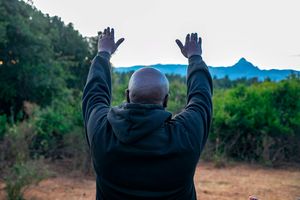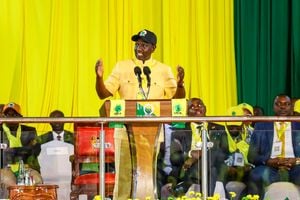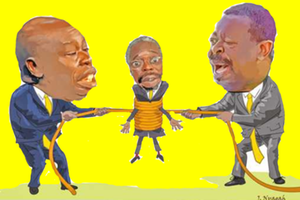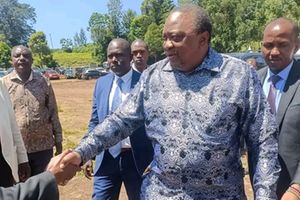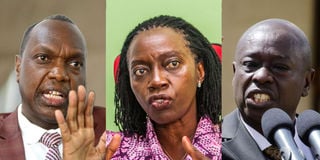
From left: Jeremiah Kioni, Martha Karua and Deputy President Rigathi Gachagua.
The nascent Mt Kenya political movement fronted by Narc-Kenya leader Martha Karua and Jubilee Party Secretary-General Jeremiah Kioni is looking to capitalise on growing disenchantment in a region that voted solidly for President William Ruto at the last elections.
The latest headache for Ruto forces in the vote-rich region led by Deputy President Rigathi Gachagua is the growing realisation that the Kenya Kwanza taxation proposals will hit farmers hard.
In the past week Gachagua has in public gatherings and meetings hosted at his official residence in Karen come face-to-face with the level of hostility to increased taxation, mainly from avocado farmers, as well as grouses over the cost of living and the general economic climate.
Pressure from Kenya Kwanza Members of Parliament from the region, farmers and the business community has forced the Deputy President to publicly concede that taxation of farming produce has to be looked at afresh.
Last week, he announced the appointment of a task force to look into the grievances of farmers. Such a process however takes time, while the immediate headache is growing resistance in his political backyard against Kenya Revenue Authority tax demands on current harvests.
Growing disenchantment in Mt Kenya and Gachagua’s inability to fill the leadership vacuum left with the exit of former President Uhuru Kenyatta stands ripe for exploitation, but there is a lot of scepticism within the Azimio coalition on Karua’s ability to galvanise the vote-rich region.
She failed to make an impact as Raila Odinga’s presidential election running mate in 2022, and it is also evident that the Kamwene Leadership Forum she unveiled last September and officially launched the following month has yet to gain traction.
Karua, however, disagrees that Kamwene has failed to make an impact. In a conversation with The Weekly Review, she disclosed that it has been busy since last December carrying out consultations, mobilising at the grassroots and establishing structures.
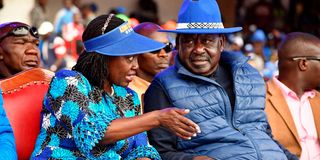
Azimio la Umoja One Kenyaleader Raila Odinga with his 2022 running mate Martha Karua during their final rally at Kasarani stadium on August 6, 2022.
There are suggestions that the movement needs a heavyweight presence such as that of the former president to catch attention.
Indeed, there is no doubt that Uhuru is watching unfolding events in Mt Kenya with much interest, and quite a bit of satisfaction after the massive voting bloc that propelled him to power in 2013 and 2018 spurned his endorsement of Raila in 2022.
He warned the region that it would regret voting for Ruto, and is now in ‘I told you so mode’.
Kenya Kwanza operatives often claim that Uhuru has been secret behind Azimio agitation, the Kamwene initiative and other moves that status quo.
But Karua answers with a firm “No, not at all” to the question on whether Uhuru directly or indirectly involved in Kamwene.
“I’ve always wondered why Uhuru’s name has to be put into everything,” she says, adding that leaders doing their own thing, including Jubilee Secretary-General Kioni, can proceed without Uhuru’s involvement.
Her response ties in with answers from two sources very close to Uhuru’s thinking who talked separately and anonymously, with The Weekly Review.
Both conceded the former president is indeed keeping an ear close to the ground, paying attention both to the Karua initiative and also to feelers from key players within the Gachagua camp in Kenya Kwanza keen to mend fences and present a united Mt Kenya front.

Deputy President Rigathi Gachagua during a past event.
However, he is determined to keep above the fray on what are essentially provincial Mt Kenya politics, preferring instead that Azimio strengthen itself as national movement.
He is cautious that any move towards an exclusively Mt Kenya political forum will play into the hands of foes who could take advantage to isolate the region by bringing back old political narratives uniting the rest of the country against Kenya’s richest vote basket.
From lessons of the 2022 election campaigns and the Ruto government's response to the post-election Azimio protests, it appears Uhuru also wants to keep away from any activities that will place him on centre-stage and provide excuses for the government to target him as the source of its problems.
In any case, goes the argument, Uhuru does not have to do anything, but will be satisfied watching a seeming self-implosion within the Mt Kenya forces in Kenya Kwanza.
Having failed to fill the leadership vacuum, Gachagua finds himself struggling to contain a restive base, with little he can do to placate Mt Kenya voters as their demands are way above his remit.
Simply put, the DP cannot reduce taxes. It would also be extremely awkward were he to present proposals for amendments to the Finance Act in favour his specific political constituency, especially with Ruto having worked tooth and nail to pass the Act in its original format.
Addressing avocado farmers last Tuesday, Gachagua gave an assurance that their grievances will be looked into.
He hinted that the Finance Act could be reviewed, and announced that a task force comprising farmers’ representatives, buyers, processors, exporters and others be formed to look into the issues and come up with firm proposals on the way forward.

Jubilee Secretary-General Jeremiah Kioni at the Ngong Race Course in Nairobi on May 22, 2023, for the party's National Delegates Convention.
Present were Cabinet Secretaries Simon Chelugui (Cooperatives and SMEs) and Rebecca Miano (Trade). Principal Secretary State Department for Crops Development Paul Ronoh and MPs Mary Wamaua (Maragua), Edward Muriu (Gatanga), Kamau Munyoro (Kigumo), Chege Njuguna (Kandara), John Mutunga (Tigania West and Chair of the National Assembly Committee on Agriculture and Livestock) and Kirinyaga Senator Kamau Murango (Chair of the Senate Committee on Agriculture).
At a public meeting in Muranga the previous day, farmers, with backing of some Kenya Kwanza MPs, spoke strongly against government taxation measures which they insisted were not what they voted for.
Munyoro tried to explain to agitated farmers that what the MPs intended with the Finance Bill was to enable the KRA collect data on agricultural production, the earnings across various stages of the value chain — farmer, broker, miller, warehouse, marketer, exporter and so on — before determining applicable taxation. The reality, however, is that technical arguments might not impress farmers faced with immediate tax demands.
The force, yet to be formally gazetted and unveiled, was reportedly given 30 days to complete its work, but it is already clear that it cannot be limited only to the issues raised by avocado farmers.
It will probably have to expand its remit to look into the taxation woes facing the entire agricultural sector, and certainly not limited to the DP’s political backyard.
The problem is that in the interim, farmer grievances stand ripe for exploitation, and Gachagua having taken centre-stage as the governments point man on the issue will be the one taking the heat.
However, his supporters insist that the Karua’s Kamwene movement even in that fluid situation presents no threat.
According to former Nyeri Town MP Wambugu Ngunjiri, who now works in Gachagua’s political communications machinery, Kamwene presents no worry because it does not offer any solutions beyond agitation.
He says no one can tell what Kamwene stands for, unlike Gachagua who is very clear in his quest for Mt Kenya unity so that the region will always have a strong bargaining position within any governing political formation.
But there is also the reality that the ground right now in Mt Kenya is not very good for President Ruto, and any well-organised campaign would be poised to make inroads into a voter massive base.
Karua advances the view that no amount of government spin will change on the ground.
What Gachagua saw in his engagement with Mt Kenya farmers and the heckling that has marred Ruto’s roadside rallies around the country reinforces her conviction in rejecting the National Dialogue report.
“It’s clear to all that people are hurting”, she says, “whereas taxes are necessary. They don’t have to be punitive and aimed at running down business and impoverishing farmers”.
The hostility to government on the grounds says it all she insists, as voters feel abandoned and betrayed by a government and MPs who ignored their cries and went on ram through a Finance Bill with tax hikes on fuel, the Housing levy and objectionable measures.
She notes that taxes on macadamia, avocado and other agricultural produce must be resisted because the government is just taking, but not doing anything for the farmers on extension services or marketing support.
Compounding Gachagua’s headache is that beyond the danger of Azimio inroads, the ground is shifting and even Kenya Kwanza leaders from the region are reading the mood. At the recent public forays, Muniu was vocal in his criticism of government taxation measures.
The Gatanga MP was the one who not too long ago caused a furore by proposing Kiharu MP Ndindi Nyoro as a suitable replacement for Gachagua alongside Ruto in the in 2027 presidential campaign lineup. Nyoro beat a strategic retreat after Gachagua’s aggressive push-back, but no doubt he is only biding his time until a more opportune time to signal his intentions.
Then there is Public Service Cabinet Secretary Moses Kuria, who too is emerging as one of Gachagua’s foes within the Kenya Kwanza power structure.
Nyoro and Kuria may be the ones standing out for now, but it is likely that there is a growing number of Mt Kenya MPs who are weighing the prospects for re-election against the shifting sands.
Right now all eyes will be on if and when the Ruto government beats a retreat on some taxes to placate the Mt Kenya voter.
This will be a major climbdown for it goes to the core of the political showdown between the government and opposition leader Raila Odinga’s Azimio la Umoja-One Kenya alliance that was only halted when the latter called off street protests on formation of a National Dialogue Committee.
Karua and Kioni were two of the prominent Azimio principals to reject the National Committee (Nadco) report currently in Parliament, protesting that it did not address core demands on the cost of living.
With Odinga since then effectively neutralised as he guns for the African Union Commission chairmanship for which he needs Ruto’s support, it appears that what seemed a leaderless opposition has been granted a lifeline with open discontent in the Mt Kenya region.
Passage of the Nadco report in Parliament with backing of both the Ruto and Raila troops, even with muted resistance from some in the Kenya Kwanza Mt Kenya brigade, is almost a certainty.
From the Azimio side, opposition from Karua, Kioni and Wamalwa will be a non-starter as they are essentially generals without soldiers.
Karua, however, insists that it is the people, rather than just MPs, who must have the final say as elements of the proposals which fundamentally change the structure of government, such as creation of Prime Minister and Leader of Opposition, must be subjected to a referendum.
“I’m aware of a conspiracy to effect those constitutional amendments without going to the public”, she charges, warning against plans to change basic structures through the back door, demanding a plebiscite where the majority will have its way and the minority its way.
Interestingly, Raila had initially demanded a referendum when the Nadco report was unveiled, but has since gone mute on the issue.
Taxation on avocado sales has forced Gachagua into fire-fighting mode, and presented Karua with the opportunity to make inroads into a voter base she had failed to effectively penetrate as Raila’s presidential election running mate in 2022.
Karua’s Narc Kenya, without a single MP, is only one of the Mt-Kenya based Azimio affiliates, the others being what remains of Uhuru’s Jubilee after nearly all the 28 elected MPs, save for two, defected with former Kieni MP Kanini Kega to Ruto’s side.
Others are Usawa kwa Wote Party of former Muranga Governor Mwangi wa Iria and PNU of former Meru Governor Peter Munya, which also don’t have any elected MPs.
It is therefore evident that Kenya Kwanza MPs from Mt Kenya who might want to jump ship have no viable ready-made vehicle to board, and Kamwene so far has not projected itself as a suitable umbrella grouping for the region.
There are also uncertainties on a post-Raila Azimio that might be left rudderless and leaderless as the dominant figure shifts attentions to the continental body.
Wiper Party leader and former Vice President Kalonzo Musyoka, who heads the second biggest political party in Azimio, is making a strong pitch to inherit Raila’s mantle. But he is coming up against key players from the ODM party who have no time for him.
Infighting is also evident with his attacks on Karua, who says she does not understand his yet everyone must have the freedom to run their own parties or movements.
She posed the question to him on X, but to date has not received a response. Karua herself remains coy on whether she is preparing for a 2027 presidential run.
“All seats are open, she says, but I don’t think there’s any hurry to declare”, adding that she remains “ready to serve and has always been whether in out of office”.
The big question, however, is whether she is ready to take up the mantle now against the reality of leadership vacuums in both Mt Kenya and the opposition alliance.

